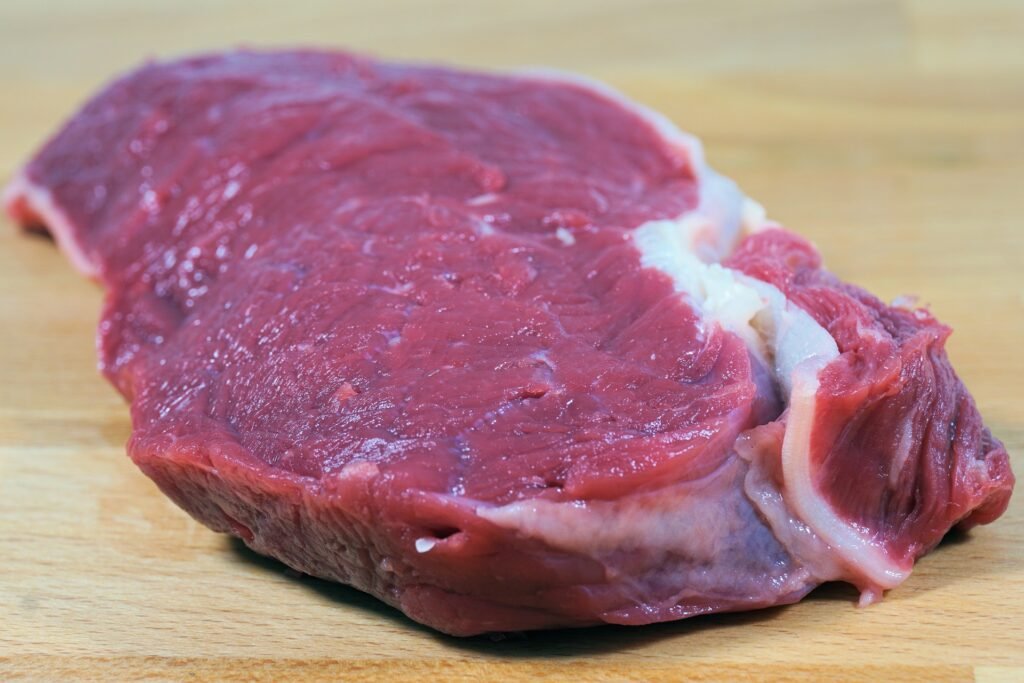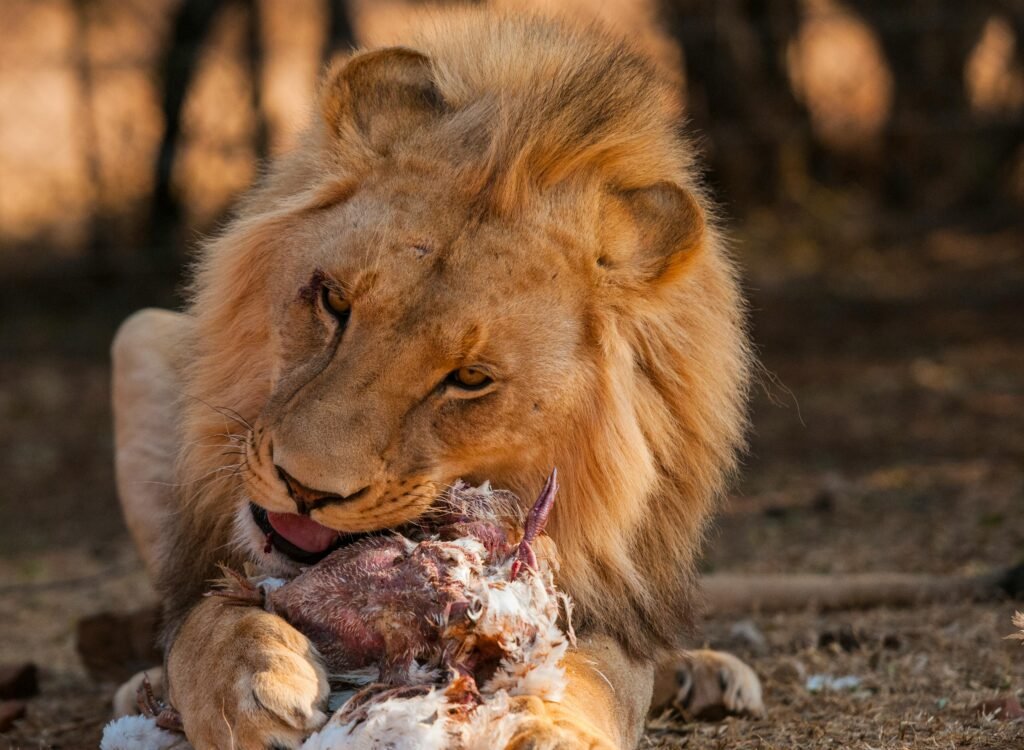1. Introduction: What Is A Carnivore Diet ?
In the realm of dietary trends, the carnivore diet has emerged as a notable contender, captivating the curiosity of many.
But what exactly is this diet, and how does it operate?
Unlike its counterparts, such as the paleo or ketogenic diets, the carnivore diet takes a particularly extreme approach, advocating for the consumption of exclusively animal-derived foods.
It’s like the opposite of going vegan.
This means no fruits, no vegetables, no grains—just meat, fish, eggs, and select dairy products.
Advocates of the carnivore diet often tout its potential to facilitate weight loss or address autoimmune conditions.
It’s frequently seen as a natural progression for individuals who have experimented with other low-carb diets like paleo or keto but find them lacking in some aspect, particularly the necessity for high fat intake in keto.
At its core, the carnivore diet reflects a belief rooted in the notion that ancestral human populations predominantly subsisted on animal-based foods and that the rise of chronic diseases can be attributed to modern high-carb diets.
Thus, the carnivore diet takes an uncompromising stance, aiming for a complete elimination of carbohydrates from one’s nutritional intake.

Image: Shawn Baker – Instagram
Shawn Baker, an orthopedic doctor and prominent advocate of the carnivore diet, has garnered attention by espousing its potential benefits in treating various health conditions, including depression, arthritis, and obesity.
However, it’s essential to approach such claims with a critical eye.
While testimonials may abound, rigorous scientific evidence supporting the efficacy of the carnivore diet remains elusive.
A notable study associated with Baker’s advocacy faced scrutiny due to methodological concerns, with experts cautioning against overinterpretation of its findings.
Additionally, Baker’s own professional history, including the temporary revocation of his medical license, adds a layer of complexity to the narrative surrounding the carnivore diet.
In essence, the carnivore diet represents a radical departure from conventional dietary wisdom, challenging long-held beliefs about nutrition and health.
While its proponents extol its virtues, the scientific community remains cautious, emphasizing the need for robust research to substantiate its purported benefits.
2. Foods you can and can’t eat while on the Carnivore Diet
Foods to Eat on the Carnivore Diet

Image by Andreas Lischka from Pixabay
When following the Carnivore Diet, your plate will primarily consist of animal-based foods. Here’s what’s on the menu:
- Red Meat: Beef, pork, and lamb are staples of this diet, with an emphasis on fattier cuts to ensure an adequate intake of calories.
- Organ Meats: Liver, heart, and kidneys are encouraged for their rich nutrient content.
- Poultry: Chicken and turkey provide additional protein options.
- Fish: Salmon, mackerel, sardines, and other fatty fish varieties offer essential omega-3 fatty acids.
- Eggs: A versatile source of protein and nutrients.
- Lard and Bone Marrow: These fats are embraced for their flavor and satiety.
- Butter: A prized addition for cooking and flavor enhancement.
- Salt and Pepper: Basic seasonings to enhance taste.
- Water: Essential for hydration.
- Bone Broth: A nourishing beverage rich in minerals.
- Sauces or Gravies: Made with meat drippings, butter, or ghee, without any added binders.
Foods Not Allowed on the Carnivore Diet

Image by Jasmine Lin from Pixabay
To adhere strictly to the Carnivore Diet, you’ll need to eliminate the following:
- Vegetables
- Fruit
- Seeds
- Nuts
- Legumes
- Bread
- Pasta
- Grains
- Alcohol
- Any other non-animal-derived foods
In essence, the Carnivore Diet revolves around animal-based foods while eschewing plant-based options entirely.
This means indulging in a variety of meats, fish, eggs, and animal fats while abstaining from fruits, vegetables, grains, and other plant-based foods.
Remember, while the Carnivore Diet offers a straightforward approach to eating, it’s essential to ensure you’re meeting your nutritional needs and consulting with a healthcare professional if you have any concerns.
Can you drink coffee while on carnivore diet?

Image by Karolina Grabowska from Pixabay
While coffee doesn’t come from animal sources and doesn’t align with the strict definition of a carnivore diet, its inclusion is a subject of debate within the carnivore community.
Advocates like Dr. Shawn Baker and Dr. Ken Berry, prominent figures in the carnivore movement, have openly acknowledged their consumption of coffee.
In a poll conducted by Dr. Baker, a significant majority of respondents affirmed their coffee intake while following a carnivore diet.
While purists may opt to abstain from coffee to maintain strict adherence to the carnivore principles, others choose to incorporate it into their dietary regimen.
Ultimately, the decision to include coffee on a carnivore diet rests with individual preferences and goals.
3. Different Variations Of The Carnivore Diet
The Carnivore Diet, renowned for its simplicity and focus on animal-based foods, offers several variations to suit diverse preferences and health goals.
Let’s explore three primary variations: the Hardcore Carnivore Diet, the Standard Carnivore Diet, and the Keto-Carnivore Diet.
Hardcore Carnivore Diet:
This variant represents the most stringent interpretation of the Carnivore Diet philosophy.
Advocates adhere strictly to animal-derived foods, encompassing red meat, poultry, and fish, with an exclusion of all plant-based foods, grains, fruits, and oils.
Some iterations of this diet even limit sources to ruminant animals like cows and sheep, along with essentials like salt and water.
Standard Carnivore Diet:
The Standard Carnivore Diet offers a more flexible approach while maintaining the core principles of the Carnivore Diet.
It encompasses a variety of animal products, including meats like beef, pork, lamb, poultry, fish, seafood, eggs, and modest quantities of dairy products and bone broth.
While it shares similarities with the hardcore version in terms of food exclusions, it allows for a broader range of animal sources, catering to individual preferences and health objectives.
Keto-Carnivore Diet:
As the name implies, the Keto-Carnivore Diet blends elements from the Ketogenic and Carnivore diets.
It aims to induce ketosis by minimizing carbohydrate intake while prioritizing animal products.
This dietary approach combines the fat-burning benefits of ketosis with the simplicity and nutrient density of animal-based foods.
By focusing on meat, fish, eggs, fats and other animal-derived products, like cheese ,while limiting carbohydrates, the Keto-Carnivore Diet offers a unique synthesis of two popular dietary paradigms.
The Lion Diet:

Photo by Frans van Heerden: https://www.pexels.com/photo/lion-eating-flesh-627667/
A popular version of the Hardcore Carnivore Diet is the Lion Diet – a highly restrictive meat-based eating regimen designed to identify potential food sensitivities by eliminating most ingredients from the diet.
The Lion Diet entails consuming only meat from ruminant animals such as cows, sheep, and deer, along with water and salt.
While akin to the Carnivore Diet in its emphasis on animal products, the Lion Diet takes restriction to a further extreme, allowing for minimal dietary diversity.
Modifications Of The Carnivore Diet
Carnivore Diet, while offering numerous health benefits, can be challenging to sustain for all individuals due to its strict nature and potential side effects.
Modifications aim to address these challenges and cater to diverse preferences and health needs.
Here are some common modifications:
- The Ancestral Diet: This variation incorporates seasonal vegetables and fruits in small amounts, drawing inspiration from the dietary patterns of our ancient ancestors.
- Carnivore Diet With Fruit: Allows for the inclusion of fruits alongside animal-based products, providing additional nutrients and flavor diversity.
- Pro-Metabolic Diet: Focuses on nutrient-dense foods to support optimal thyroid function, blood sugar regulation, and overall metabolic health.
- The Greenish Carnivore Diet: Combines meat consumption with a small amount of leafy greens and low-carb vegetables, offering a compromise between strict carnivore principles and plant-based nutrition.
- The Seafood Carnivore Diet: Tailored for seafood enthusiasts, this variant emphasizes the consumption of various seafood while adhering to carnivore principles.
Each modification offers a unique approach to animal-based eating, providing options for individuals to customize their diet based on personal preferences, health goals, and lifestyle factors.
4. Carnivore Diet Risks
While the Carnivore Diet seems to have some potential benefits, it’s essential to consider the associated risks before diving in.
Here are some potential pitfalls:
- Heart Disease: The diet’s emphasis on high-saturated fat foods, like fatty steaks, may elevate cholesterol levels, increasing the risk of heart disease. Moreover, the exclusion of fruits, vegetables, and whole grains, known to mitigate heart disease risk, may further compound this risk.
- Vitamin and Mineral Deficiencies: Due to its restrictive nature, the Carnivore Diet may lead to deficiencies in essential nutrients such as vitamins A, C, and B12, typically obtained from plant-based sources.
- Digestive Health Issues: Limiting the diet to animal products may result in digestive discomfort, including nausea and constipation, due to reduced fiber intake.
- Complications for Certain Populations: Individuals with specific health conditions, such as those without a gallbladder, cardiac issues, diabetes, or pregnant and nursing women, may face additional complications on the Carnivore Diet. It’s crucial for such individuals to consult healthcare providers before embarking on this dietary regimen.
In summary, while proponents of the Carnivore Diet tout its potential benefits, including weight loss and improved chronic conditions, it’s essential to weigh these against the potential risks and consider the diet’s long-term sustainability and environmental implications.
Consulting with healthcare professionals and adopting a balanced approach to nutrition is crucial for mitigating potential drawbacks associated with the Carnivore Diet.
5. Carnivore Diet Benefits
The Carnivore Diet, while highly debated, is purported to offer several potential benefits.
Let’s explore some of these benefits based on available research:
- May Improve Blood Sugar Regulation: The Carnivore Diet’s low-carb nature may aid in better blood sugar control, particularly for individuals with diabetes. Studies indicate reductions in hemoglobin A1c levels and decreased reliance on diabetes medications among participants with type 2 diabetes.
- May promote Weight Loss: By eliminating high-carb foods and emphasizing protein-rich animal products, the Carnivore Diet may facilitate weight loss, particularly in the short term. Participants in studies reported significant reductions in body mass index (BMI) after adopting the Carnivore Diet.
- May Enhance Overall Health: Preliminary evidence suggests that adhering to the Carnivore Diet may lead to improvements in overall health, including physical and mental well-being, and alleviate symptoms of certain chronic medical conditions. Participants in a 2021 study reported high levels of satisfaction and reported benefits in various health markers.
While these potential benefits are promising, it’s essential to approach the Carnivore Diet with caution and consider its limitations.
Long-term sustainability, nutrient deficiencies, and environmental concerns are critical factors to consider when evaluating the suitability of the Carnivore Diet for individual health goals.
Additionally, more research is needed to fully understand the long-term effects and overall health implications of the Carnivore Diet.
While initial studies show promising results, further investigation is necessary to establish the diet’s efficacy, safety, and potential risks over extended periods.
6. Carnivore Diet Meal Ideas
Here are some delicious options to consider for breakfast, lunch, dinner, and snacks:
Breakfast:
- Three eggs cooked in butter with ham
- Eggs with bacon and sardines
- Scrambled eggs with salmon and turkey sausage
- Chicken livers and scrambled eggs
Lunch:
- Grilled salmon paired with fried pork
- Beef liver
- Rib eye steak
- Turkey burger patty with a side of salmon jerky and beef tips
Dinner:
- Ground beef patties seasoned to your liking
- Bison burgers
- Classic hamburger patties served with crispy bacon
- Crab cooked in lard alongside a flavorful filet mignon
Snacks:
- Sardines for a quick and nutritious snack
- Codfish liver
- Hard-boiled eggs for a protein-packed snack
- Beef jerky or turkey jerky whenever hunger strikes
7. Carnivore Diet Recipes
8. Interesting Fact – Jordan Peterson’s Carnivore Diet
Did you know that Jordan Peterson, the famous and controversial Canadian psychologist, author, and media commentator, ventured into an extreme dietary regimen known as The Lion Diet and experienced remarkable benefits?
Peterson, known for his intellectual prowess and often-discussed personal struggles, disclosed his journey on the Joe Rogan Experience podcast.
He revealed that he had adopted a diet consisting solely of beef, salt, and water, inspired by his daughter Mikhaila’s health journey.

Image: Michaila Peterson – Instagram
Mikhaila, who had battled health issues for years, found relief by eliminating all foods except meat, salt, and water, prompting Peterson to follow suit.
Surprisingly, Peterson reported significant improvements in his physical and mental health, including weight loss, relief from anxiety and depression, and the resolution of various health issues such as reflux and gingivitis.
Despite the extreme nature of his diet, Peterson remained steadfast, claiming intellectual clarity and physical vitality.
His story highlights the potential impact of dietary interventions on health and underscores the importance of individualized approaches to wellness.
Disclaimer !
While Jordan Peterson’s experience with The Lion Diet is intriguing, it’s important to note that extreme diets like this may not be suitable or safe for everyone.
Before going on any type of diet, including extreme ones, it’s crucial to consult with a healthcare professional to ensure it aligns with individual health needs and goals.
Each person’s body responds differently to various foods, and responsible decision-making regarding dietary choices is essential for overall well-being.